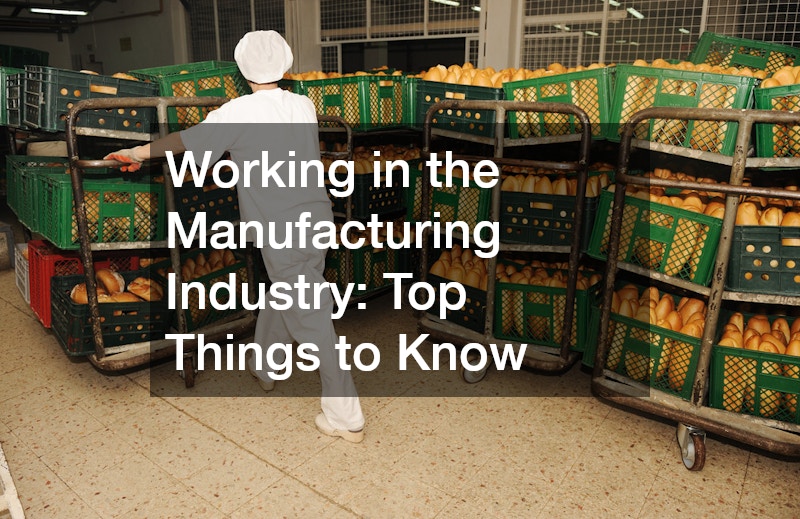Manufacturing is a dynamic, multi-faceted industry that plays an important role in the global economic system. The manufacturing industry encompasses many activities, from the production and refinement of raw materials to goods. There are several important aspects to consider if you are considering a career as a manufacturer or already working in this vital industry.
Manufacturing Industry Overview
Manufacturing is the cornerstone of modern civilization, driving technological advances and economic growth. The manufacturing sector encompasses everything from small-scale operations to massive industrial operations. Each contributes to the creation and use of products we all use every day. This industry is huge, with sub-sectors like automotive, aerospace, and electronics, as well as food and beverages and pharmaceuticals.
Global manufacturing often means that components and products are sourced, manufactured, and assembled in various parts of the globe. Interconnectedness can lead to greater efficiency and lower costs. However, it can also create complexity and vulnerabilities, such as supply-chain disruptions.
Key Players and Components
The manufacturing process is dependent on a number of key players and components. Understanding these elements will help you gain a better understanding of the way the industry works and the various roles that are available.
Lubricating Oil Producers: These companies manufacture essential oils that are used to reduce friction in machinery and ensure smooth, efficient operation. The use of lubricating oil is essential for the performance and longevity of industrial equipment. Machinery can overheat, causing costly repairs and downtime.
These heaters provide controlled, consistent heating for various manufacturing processes. They are more suitable for applications that require clean heat than direct-fired heaters because they don’t emit combustion gases. Indirect-fired heating systems are used by industries like food processing, pharmaceuticals, and chemical manufacturing, where product contamination is a concern.
Renting a reefer trailer is essential for the transportation of perishable products. Reefer trailers or refrigerated trucks maintain a certain temperature to ensure that products such as food and pharmaceuticals stay fresh while in transit. Reefer trailers are equipped with advanced cooling systems and are an essential part of the cold chain logistics that ensure the integrity of temperature-sensitive products from production to delivery.
Safety and Legal Considerations

Safety is a priority in the manufacturing industry because of the inherent risks. Employers are required to adhere to strict safety rules to protect their employees and maintain operational efficiency.
Injuries at the workplace are common in manufacturing. Workers compensation attorneys help employees receive the benefits that they deserve following a workplace accident, including medical care and financial assistance. These attorneys are crucial in navigating through the complicated legal landscape that is workers’ compensation claims. This can include disputes about the extent of the injuries, the need for medical treatment, and the calculation of lost wages.
Bail: Although not directly related to manufacturing or production, workers may find themselves in unexpected situations that require bail. Understanding the bail process is important for workers who are involved in accidents that have legal implications.
Specialized Manufacturing Services
To support the diverse operations of manufacturing, a variety of specialized services are required. These services are essential to ensuring that production is run smoothly and efficiently.
Bar Joist Service: Bar joists play a vital role in the construction and design of industrial buildings. These steel joists are used to support the roofs and floors of industrial buildings, providing stability and safety. The bar joist service includes the design, fabrication, and installation of these components tailored to each project’s needs. Bar joists are ideal for heavy loads, as they can span large distances and support them without needing additional columns.
Oil Tank Installation Company: Oil tank installation companies can provide infrastructure for industries that use large amounts of fuels or lubricants. For safe and efficient operation, it is crucial to install and maintain these tanks correctly. Companies that install oil tanks must follow strict regulations in order to avoid spills and leaks, which could be harmful to the environment. Tank inspections, repairs, and decommissioning are also offered by these companies to ensure that tanks remain in good shape throughout their lifetime.
Local Oil Tank Removal: It is important to remove oil tanks safely when they are no longer required. This will prevent contamination of the environment. Local oil tank removal ensures that tanks are properly dismantled and disposed of in accordance with environmental regulations. The process includes draining and cleaning the tank to remove residual oil. It is then safely cut and removed from the site. To avoid fines or legal issues, it is important to comply with local regulations and provide proper documentation.
Roles in Technical and Maintenance
Manufacturing offers many technical and maintenance jobs that are critical to the smooth running of production lines and machines.
Hard Chrome Plating – This is a process that involves electroplating an extra layer of chrome onto metal components to improve their durability and corrosion resistance. Hard chrome plating is often used in the manufacture of automotive parts, tools, and machinery. This process increases the surface hardness and wear resistance of metal parts, which extends their life and reduces maintenance costs. The hard chrome plating process is valued because it reduces friction and can increase the efficiency of moving components.
Brake Repairs – are often included in the maintenance of industrial machinery. Brakes that work properly are vital for the safety and efficiency of heavy machinery used during manufacturing processes. Due to their demanding applications, such as stopping and holding heavy loads, industrial brakes experience significant wear. Brake inspections are important to prevent accidents, and they ensure that machines run smoothly and safely.
Career Paths and Opportunities

The manufacturing industry offers a wide range of career paths, from entry-level positions to technical roles at the highest levels. Each position is vital to the production process and provides opportunities for advancement.
Entry-Level Positions: These positions include machine operators and assemblers. These positions allow employees to gain experience and skills while learning about different aspects of manufacturing. These positions require a basic level of technical knowledge and the ability to adhere to detailed instructions. Employees can earn additional certifications and training as they gain experience. This will allow them to move into more specialized roles or supervisory positions.
Trades that require special training: Welders and electricians, as well as machinists, are all positions that require certification and specialized training. These positions are essential for the construction, repair, and maintenance of manufacturing equipment and facilities. Tradespeople with technical expertise are in demand because they can perform complex tasks and are able to maintain production lines. These high-paying careers are only possible through apprenticeship programs and vocational training.
Engineering and Management: For individuals with advanced education or experience, engineering and managerial positions provide opportunities to oversee production processes, lead projects, and design new products. These positions often require an in-depth understanding of manufacturing principles as well as leadership skills. Manufacturing engineers may specialize in mechanical, electrical, or industrial engineering. They focus on improving production processes and product quality and implementing new technologies. Production managers, plant supervisors, and other management positions involve managing budgets and teams while ensuring production goals are met safely and efficiently.
The Future of Manufacturing
Manufacturing is a dynamic industry, constantly evolving due to technological advances and market changes. Professionals can stay competitive by staying informed about new trends and innovations.
Automation and robotics: Automation transforms manufacturing by increasing productivity and reducing costs. Robots perform repetitive tasks, allowing humans to concentrate on more strategic and complex activities. Cobots or collaborative robots work with human employees to increase productivity and reduce the risk of injury. Automation allows manufacturers to respond more quickly to market demand and scale up production.
Sustainability and Green Manufacturing – Environmental concerns have prompted the industry to adopt green manufacturing practices. Reducing waste, conserving energy, and using eco-friendly products are all part of this. Businesses that place a high priority on sustainability will likely gain an edge over their competitors. Initiatives like zero-waste production, renewable energy integration, and sustainable supply chain management help reduce production’s impact on the environment. Investors and consumers are more likely to favor companies that demonstrate a commitment to sustainability. This is driving the industry in a greener direction.
Industry 4.0: The Fourth Industrial Revolution, also known as Industry 4.0, is characterized by the integration of digital technology, such as the Internet of Things (IoT), Artificial Intelligence (AI), and big data analytics. These technologies allow for smarter manufacturing, predictive maintenance, and real-time decisions. IoT devices gather data from machines and production lines to provide insights that can be utilized to optimize operations and avoid equipment failures. AI algorithms examine this data and identify patterns to make recommendations on how to improve efficiency and quality. Big data analytics allows manufacturers to make data-driven decisions, improve supply chain visibility, and respond more quickly to market trends.
Challenges and Solutions
Manufacturing faces several challenges which can affect productivity and growth. It is important to understand these challenges and implement effective solutions for success.
Supply Chain Disruptions – Global disruptions in the supply chain can impact raw materials and component availability. To mitigate these risks, companies must adopt resilient supply chain strategies. This includes diversifying their suppliers and maintaining buffer stock. Manufacturing companies can anticipate disruptions and react to them with real-time monitoring and supply chain visibility tools. This will ensure continuity of production. Supply chain resilience can be improved by strategic partnerships with suppliers and investments in local sourcing.
Shortages of labor: This industry is often plagued by a shortage of workers, especially in the skilled trades. Training and apprenticeship programs help to retain and attract talent and ensure a stable workforce. Students can enter the manufacturing industry through collaboration with educational institutions and associations. Employers can offer competitive salaries, benefits, and career development to attract and retain qualified workers. Diversity and inclusion can broaden talent pools and create more dynamic workers.
Regulatory compliance: Manufacturing companies are required to comply with a variety of regulations relating to safety, the environment, and product quality. Staying up-to-date on regulatory changes and implementing robust programs to ensure compliance can help you avoid fines and legal issues. For a company to adhere to regulations, regular audits, inspections, employee training, and investments in compliance management software are vital. To stay informed about evolving standards and best practices, companies should engage with industry associations as well as regulatory bodies.
Technological Advancements: It can be difficult for small and mid-sized manufacturers to keep up with the rapid technological advances. To remain competitive, it is essential to invest in research and technology, upgrade equipment, and adopt new technologies. Businesses should focus on innovation and continuous improvement and leverage emerging technologies to improve productivity and product quality. Collaborations with technology providers and industry consortia can help companies access cutting-edge innovations.
Global Competition. The manufacturing industry is extremely competitive. Companies from all over the world compete for market shares. Manufacturers must concentrate on efficiency, innovation, and quality to remain competitive. Manufacturers can stand out in a crowded marketplace by offering products with unique features, superior performances, and exceptional customer service. Lean manufacturing principles and agile production techniques can improve operational efficiency and customer responsiveness.
Environmental Impact: Manufacturing can have a significant impact on the environment, such as pollution, resource depletion, and greenhouse gas emissions. It is important to adopt sustainable technologies and practices in order to reduce the environmental impact of manufacturing operations. To minimize their environmental impact, companies can invest in renewable energies, implement energy-efficient technologies, and reduce waste. Environmental management systems and reporting on sustainability can be used to track progress and show a commitment towards responsible manufacturing practices.
Customer Expectations: Customers are increasingly demanding high-quality products that can be customized and delivered quickly and with competitive prices. Manufacturers need to be flexible and responsive to market and customer trends. Implementing advanced manufacturing techniques, such as 3D printing (3D prototyping), can allow for rapid prototyping, customization, and meeting customer needs more effectively. Data analytics and customer feedback can be valuable for improving product development.
It is important to ensure that workers have the knowledge and skills necessary to operate the advanced manufacturing technologies. Continuing education and professional development can help employees keep up with the latest industry trends and technological advances. Manufacturers can encourage continuous learning and skill development by creating learning cultures. By partnering with industry associations and educational institutions, you can gain access to certifications and training resources. Fostering a culture that encourages innovation and collaboration will empower your employees to improve processes and contribute to the success of your company.
Manufacturing offers many opportunities to those who are willing to accept its challenges and rewards. Understanding the different aspects of manufacturing, from technical and maintenance roles to specialized service and safety considerations, is crucial for success. Professionals can create rewarding careers by staying up-to-date on industry trends and challenges. Manufacturing is a dynamic industry that offers many opportunities.
Manufacturing is more than just producing products. It’s also about problem-solving and continuous improvement. The opportunities available to those passionate about making an impact will continue to grow as the industry continues its evolution. The manufacturing industry is a great place to start a career or advance your career.
You can achieve success in manufacturing by understanding key players, components, and technological advances, as well as tackling challenges. Be proactive, embrace the opportunities, and stay informed. With the right skills and knowledge, you can help shape a bright future for manufacturing.
